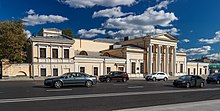Yulia Ivanovna Basanova
Yulia Ivanovna Basanowa born, Yulia Ivanovna Ljawdonskaja , ( Russian Юлия Ивановна Базанова , maiden name Russian Юлия Ивановна Лявдонская * 1852 in Irkutsk , † 1924 in Moscow ) was a Russian clerk of the 1st Moscow merchant guild , entrepreneur and philanthropist .
Life
Yulia Ivanovna was the daughter of the officer Ivan Lyawdonsky. After the early death of her parents, she grew up with her grandfather. After attending the Institute for Higher Daughters of Eastern Siberia in Irkutsk, she married Pyotr Ivanovich Basanov, son of the Irkutsk merchant and gold entrepreneur Ivan Ivanovich Basanov .
After her father-in-law died in 1883 and her husband died in 1892, Yulia Basanova became the sole owner of the majority of the capital of the Basanov family in 1892 . She ran the family business, which included mines in Siberia in particular , and continued the charity of the Basanov family. The history of many institutions and organizations in Irkutsk is connected with her name. These included a home for the children of those arrested, a kindergarten, a house for foundlings and a teachers' college, as well as a children's hospital. She had been an honorary member of the Society for the Support of Needy Students since 1887.
Basanowa settled with her daughter Varvara in the Moscow villa of the Basanovs on Mochowaja Ulitsa, which was built in 1886 by Simon Eibuschitz and Alexander Stepanowitsch Kaminski and acquired in 1892. Basanova donated 1 million rubles to the medical faculty of Moscow University (MGU) for the construction of an ear clinic, which was built on the initiative of Nikolai Petrovich Simanowski in the Gorodok Clinic on Moscow's Devich Pole and opened in 1896 with Stanislav Fyodorowitsch von Stein as director. On the initiative of the MGU Council, Robert Romanowitsch Bach made a marble bust of the founder and placed it in the entrance hall of the clinic in 1896. The Moscow city duma named Basanova's clinic. Emperor Nicholas II expressed his deepest gratitude to her and gave her a portrait with his signature. In 1897 she received the gold medal For Duty of Duty on the ribbon of the Order of Saint Anne . With a further half a million rubles from Basanowas, the clinic developed into a scientific center for ear, nose and throat medicine . In addition, she took part in the construction of the N. A. Alexejew Hospital for Psychiatry . At the request of Lev Nikolayevich Tolstoy , she helped transport the Caucasian Duchoborzen across the ocean.
Due to the uprising in the mines on the Lena in 1905, Basanowa got into economic difficulties, whereupon she sold the mines to an English company. In 1906 she also had to sell the Moscow Basanov villa and move into a rented apartment. Nevertheless, she continued to support her projects. In 1909 she became an honorary citizen of the city of Irkutsk.
After the October Revolution , Basanova's property was nationalized. Her bust in the ear clinic was removed. It was not until the 1990s that the Basanova bust was found again during renovation work. Now it is in the Museum of Medical History of the First Moscow State Sechenov University of Medicine .
Basanova was buried in the Vvedenskoye cemetery .
Individual evidence
- ↑ a b c d e f Знаменитости Байкала (accessed March 17, 2019).
- ↑ a b c d Базанова, Юлия Ивановна (accessed March 17, 2019).
- ↑ a b c d e f Иркутская барыня: история о самой передовой в Москве клинике и самой богаитой благелтворитой благетворитой благетворител, accessed on March 18, 2019.
- ↑ Варвара Базанова и Александр Кельх - клиенты фирмы Фаберже (accessed March 18, 2019).
- ↑ Е. Ю. Горбунова: Благотворители и меценаты в истории Московского университета . Издательство Московского университета, Moscow 2010, ISBN 978-5-211-05745-6 , p. 294 .
| personal data | |
|---|---|
| SURNAME | Basanowa, Julija Ivanovna |
| ALTERNATIVE NAMES | Ljawdonskaja, Julija Ivanovna (maiden name); Базанова, Юлия Ивановна (Russian); Лявдонская, Юлия Ивановна (Russian) |
| BRIEF DESCRIPTION | Russian business woman, entrepreneur and patron |
| DATE OF BIRTH | 1852 |
| PLACE OF BIRTH | Irkutsk |
| DATE OF DEATH | 1924 |
| Place of death | Moscow |


